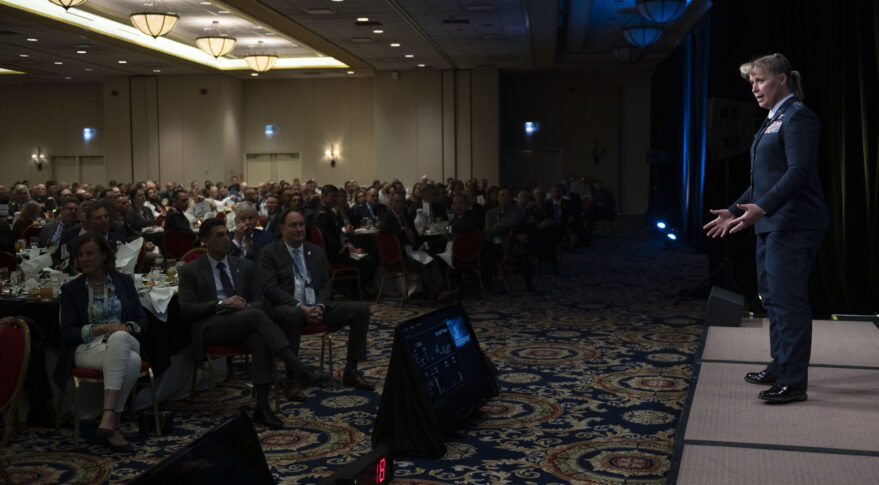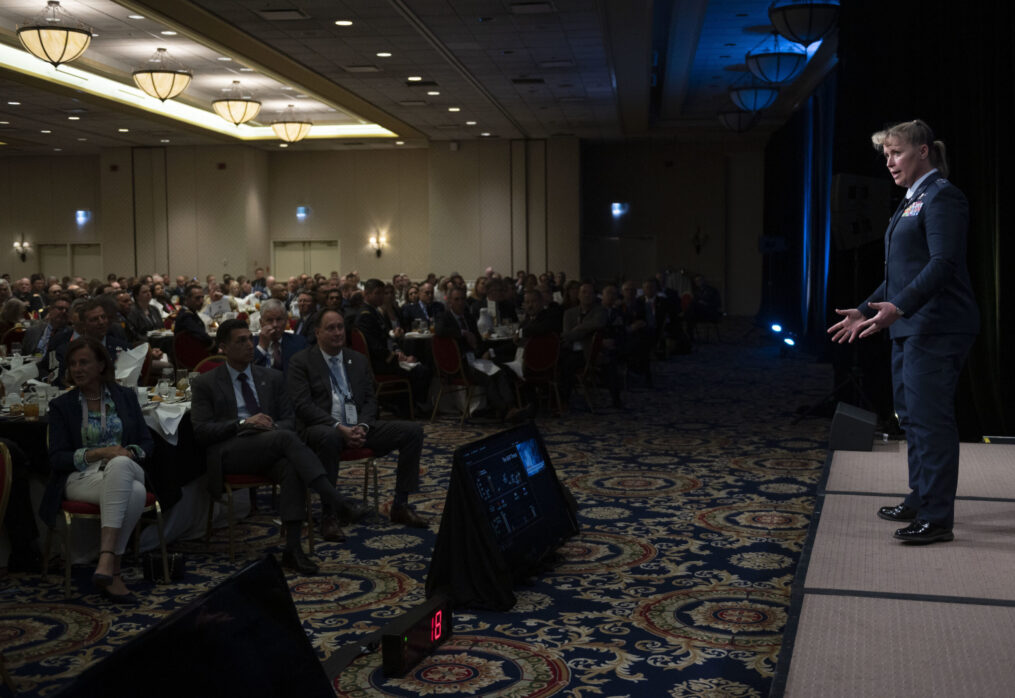As DoD grows more reliant on space industry, it needs to define the relationship
by Sandra Erwin —

DoD and the intelligence community are laying out requirements for how they would use commercial space systems during wartime
NATIONAL HARBOR, Md. — The conflict in Ukraine has shed light on the value of commercial satellites for national security, but there are still open questions on how the military will work with private space companies in wartime, said Maj. Gen. DeAnna Burt, special assistant to the chief of space operations of the U.S. Space Force.
“Now we need to codify our relationships with commercial [industry] to best bring those capabilities to bear in a fight,” Burt said Sept. 21 at the Air, Space & Cyber conference.
Burt, who was recently commander of U.S. Space Command’s Combined Force Space Component, led the command’s “commercial integration cell,” a group of 10 companies that share classified information about potential threats in orbit.
The cell started as a pilot program in 2015 to facilitate data sharing between the U.S. military and commercial satellite operators. The member companies sign cooperative agreements with the government but are not paid.
Three CIC members — SpaceX, Viasat and Maxar — have supported Ukraine and allies, providing services like communications and satellite imagery, Burt noted.
“All three of those companies were very much engaged in their own business, working with Ukraine, but we tried very hard to make sure, where we could, that we could talk with them and integrate with them,” she said. “As U.S. companies, was there anything we could do to help them?”
Russia’s invasion of Ukraine and the war that followed have shown that the military is becoming more dependent on commercial space services, more so than in previous conflicts, said Burt. How the military, for example, would integrate commercial space services into a hybrid architecture needs to be defined.
Burt said U.S. Space Command and the Space Force are working with the intelligence community to lay out requirements for commercial space systems and “and how we would leverage those capabilities.”
In previous wars DoD typically leased satellite capacity from commercial operators “or we would have a whole satellite dedicated to us,” said Burt. The industry now offers fully managed services and “now we need to think about buying things as a service, versus having to put guardians on consoles doing that.”
DoD to increase use of commercial space
Gen. John “Jay” Raymond, chief of space operations, told reporters Sept. 21 that one of the takeaways from the war in Ukraine is the value of commercial space systems.
“You’ve seen where they’ve used Starlink, they’ve used commercial ISR [intelligence, surveillance and reconnaissance] capabilities,” said Raymond. “I think that’s going to continue to happen as the commercial space industry continues to blossom. There’s going to be more and more missions that are commercially viable.”
The idea that the military will become more dependent on commercial satellites for imagery and other services has set off discussions on how DoD might compensate companies if their spacecraft is damaged during an armed conflict.
Industry executives speaking on a panel at Air, Space & Space said these are important policy issues that need to be resolved so the industry can plan accordingly.
“I’m very excited that the conversation is starting,” said Bryan “Stu” Eberhardt, senior director of satellite systems at Boeing.
“The commercial industry is very different in how it gets incentivized to do business,” he said. “And if the government is waffling on the fence about whether or not they’re investing in a service that they want provided,” the government might end up not getting that service, he added.
If the government commits to providing financial support, companies will make sure government needs are taken into account when they develop their next generation systems, said Eberhardt. “So I think having this conversation at this point in time is really crucial.”
James Reynolds, vice president of business development for defense space at SAIC, said it’s all about assessing risk. In the space industry, investors take a lot of risks and they would welcome “some assurance that the government will support you for taking that risk.”
Having a contractual agreement where the government compensates industry if commercial satellites are attacked “I think is a great way to make sure that we’re all working together, bringing in all the capabilities that we can, all the data sources that we can, to take on this threat.”
“If commercial satellites get caught up in some irresponsible behavior, then we have to do what it takes as a nation to win,” said Shon Manasco, senior counselor at Palantir Technologies.
“That means addressing this policy and being clear about what the federal government will do,” he said. “I think that is something that is absolutely imperative.”
